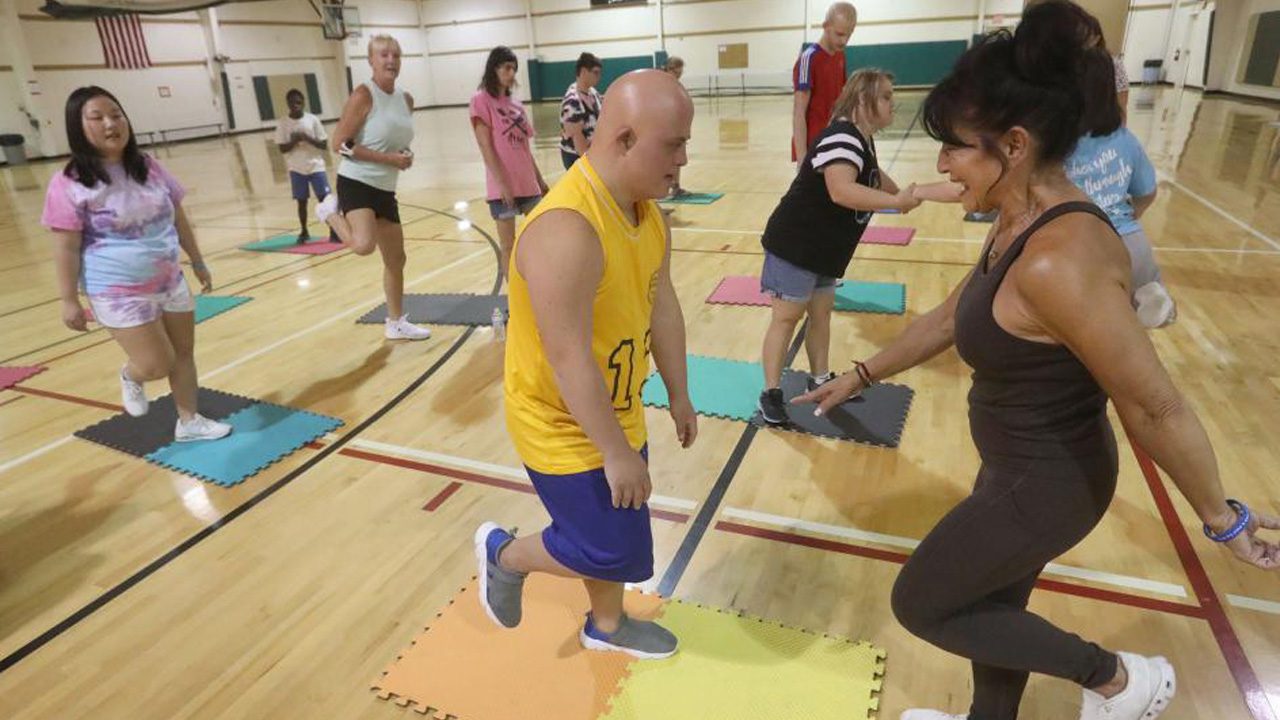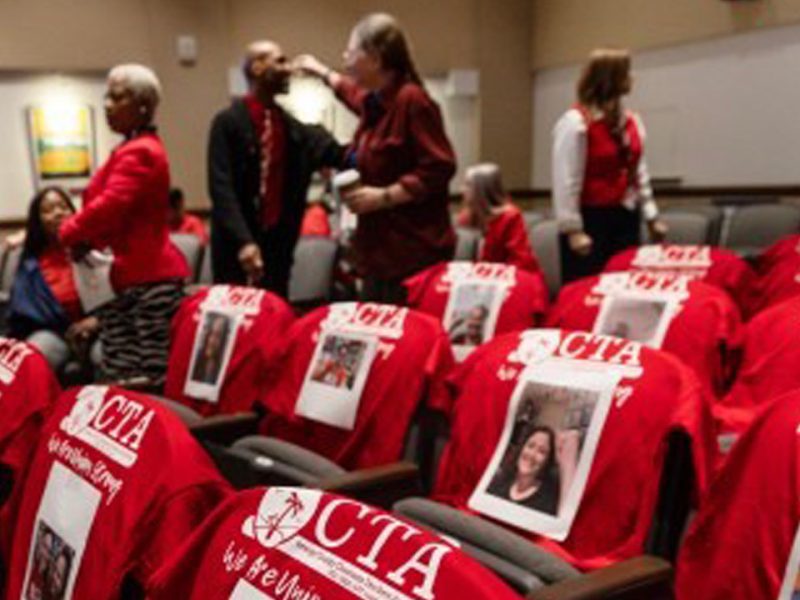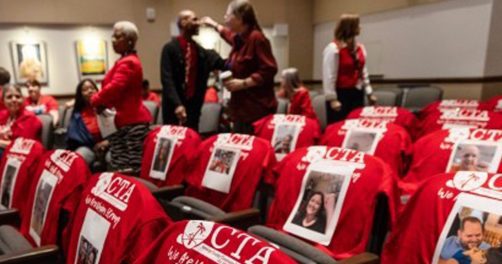What happens to ESE students when they leave Volusia schools? Families advocate for inclusion
The Daytona Beach News Journal | By Mary Ellen Ritter | November 18, 2024
Whether enrolling in college, entering the workforce or enlisting in the military, most high school seniors have an idea of what’s next as they prepare to graduate from Volusia County Schools.
But a streamlined path isn’t always guaranteed.
Parents, siblings and teachers of Exceptional Student Education students said there is often no clear plan for individuals with disabilities and that, historically, the district hasn’t actively assisted them in making the transition.
With a new executive ESE director at the helm this year, the district hopes to build upon what it already offers its students. But that’s one part of the transition plan.
Since resources in Volusia County — like adult day programs, rehabilitation centers and on-the-job training, among others — are somewhat limited when compared to offerings in other parts of the state, parents said they struggle to find what does exist here.
Until recently, the district didn’t host career, resource or job fairs for ESE students, which made it difficult for families to learn about options early and determine what would be the best fit for them.
Plus, some resources have years-long waitlists, parents said. And if they’re privately owned, they can deny individuals service for being either “too disabled” or “not disabled enough,” parents continued.
So, families became creative in writing their next chapter.
This summer, Shirley Lund and her husband, Frank, opened Pure Joy Cat Cafe, a nonprofit coffee shop with a cat lounge, kitten room and adoption center.
Their son, Isaac Morden, works there. He has Down syndrome and aged out of Volusia County Schools’ transitional program at Seabreeze High School in May.
“Because Volusia County didn’t help us with any sort of transition,” Lund started, “we made the transition ourselves by pretty much creating a new business for Isaac to run.”
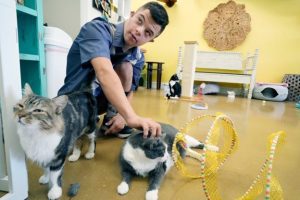
Isaac Morden works with some of the clients at the Pure Joy Cat Cafe in Daytona Beach, Friday, Sept. 20, 2024.
Lund said she was generally unsatisfied with her son’s experience in the district and felt Morden was more isolated than included.
“We unfortunately had to advocate strongly for Isaac during his IEPs (individualized education plan meetings) to the point that we reached out to Disability Rights of Florida and had an advocate with us at meetings for the last couple years,” she said.
“We had tried to get Isaac included with the general ed population by having him experience electives, and his favorites were chorus and keyboard and culinary,” she added. “But the school continued to fight us about that and wanted him isolated in the ESE building. … He should have had the same opportunity that every other high schooler had.”
Morden will help with day-to-day cleaning at the cafe. But his biggest responsibility will be interacting with guests.
“That’s what he lacked while he was at Seabreeze High School — was the socialization with gen ed people,” Lund said. “So we’re trying to make up for lost time.”
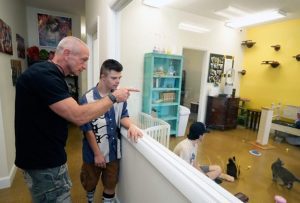
Isaac Morden and his dad, Frank Lund, work at the Pure Joy Cat Cafe in Daytona Beach, Friday, Sept. 20, 2024.
Lund will assist with the shop on weekends, and since Morden’s father is retired, he will work there full-time with his son. He is also forming a partnership with Easterseals so other individuals with disabilities can work for pay at the shop, too.
Pure Joy Cat Cafe is located on Beville Road in Daytona Beach and took about a year to get up and running.
“We funded this ourselves, which other families might not have that ability to fund and build a business for their child,” Lund said, noting that costs equaled approximately $100,000 and came from their retirement savings.
“We were really thinking about going to court for due process … and we thought, why spend thousands of dollars to fight a system, fight the government and lose? Why not put those thousands of dollars into something positive and grow a business for Isaac? And that’s what we did instead,” she continued. “But even though we didn’t fight the system … we want our voices heard.”
One parent did take Volusia County Schools to court
Just like Lund, Anni Suadi felt her son’s experience in Volusia County Schools was more isolating than inclusive.
She filed state and federal complaints in 2022 alleging the district discriminated against her son, Lance Avery, who has Down syndrome, and other students with disabilities at Seabreeze High by denying them electives.
A judge sided with the district and determined there was no violation to Avery’s IEP.
In a January 2023 interview, once the final order was determined, Suadi told The News-Journal she wasn’t done fighting. Advocating for inclusion is still her “mission.” And she’s taken tangible strides thus far.
Starting with her son, Suadi found Avery work through the PASS (Plan to Achieve Self-Support) agency, a social security income service helping individuals with disabilities return to work.
Avery aged out of Volusia’s transitional program in December 2022; however, Suadi said he hasn’t attended school since August 2022.
Avery’s first job was at Planet Fitness. Now, he works at the Nova Community Center in Ormond Beach where he greets guests, sweeps floors, cleans windows and puts away gym equipment.
“He’s just awesome,” Suadi said.
Avery also participates in “Active Wednesdays” at the Nova Community Center, a one-hour exercise class for adults with disabilities led by Suadi.
“I see them (and) they glow,” she said. “Fitness and exercise, it gives them more self-esteem and confidence.”
Suadi spoke at Volusia County Schools’ Sept. 24 board meeting, sharing Avery’s story and urging the board to implement the following changes so ESE students can feel more comfortable participating in society:



